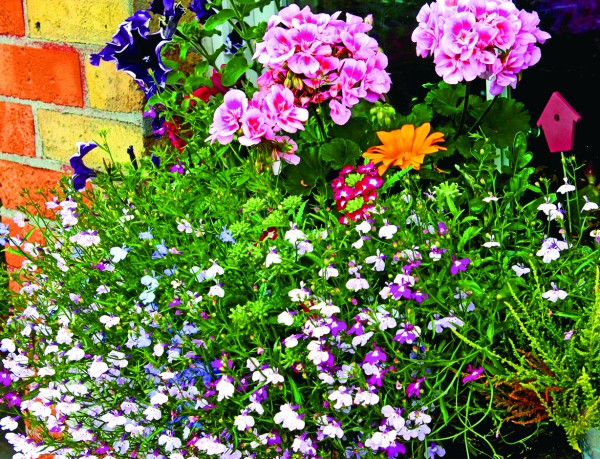
“God writes the gospel not in the Bible alone but on trees and flowers and clouds and stars” (Martin Luther King)
Gospel means good news, and if there is a season of good news in the garden it is to my mind the summer season.
We are well into the Summer Epoch, the great months of blossoms and ripening fruit. The longest day has passed but each month has its own special charm and August and September are no different. The days remain pleasantly warm and it is a time to enjoy rich beautiful flora, colour, fragrance and plants bursting with life.
It is a good time to be a gardener – gardens are enhanced with gladioli, geraniums, petunias – all competing with late-flowering trees and shrubs, the lovely lace cap hydrangeas, ceanothus, hibiscus with its lovely blue flowers, the butterfly bush (buddleia davidii) attracting butterflies with its pale lavender flowers. It is really a season of colour.
So what tasks are busy gardeners up to during these months?
Remember attention to detail will keep your garden fresh and interesting. Prune summer flowering shrubs as soon as they have finished flowering, as this will encourage new shoots. Divide and replant iris. Prune rambling roses and continue to dead roses and flowers in beds to ensure continual flowering.
Mow your lawn frequently at this time of year. September is the best month for sowing grass seed or laying turf. Continue to water and feed all hanging baskets, window boxes and containers with a tomato fertiliser. Sow hardy annual flowers like calendula, cosmos, sweet pea in the open ground in a sheltered spot and they will flower early next year.
It’s also time to plant or replant the beautiful Madonna Lily (L Candidum) a plant idolised by ancient Greece. It is universally recognised as a symbol of peace and all that is good in life. The Madonna is the oldest of all the lilies, it likes a warm sunny position in well drained soil, do not plant it too deeply – two inches is enough. It is also time to plant autumn flowering bulbs – crocus and colchicums.
Once flowering is over, lavender can be clipped back, but be careful not to cut into the older wood. A lavender hedge looks well in paved areas of stone or brick. For a dwarf hedge, plant lavender Munstead.
In the vegetable garden, foresight and good management are very important. Stop outdoor tomatoes when they have produced four trusses of fruit to help ripen them. Sow some spinach and keep hoeing between the rows. Begin successful sowings of spring cabbage and sow turnips and Japanese onion sets. Sow white Lisbon onions and lettuce.
Now is the time to cut back your raspberries and plant strawberry runners for next year. Plant narcissi of all kinds during September and do not plant tulips until November. September is also the ideal month to plant evergreen shrubs and trees, perennials and biennials. Turn your attention to the final hedge clipping at this time also.
You may recall that last year environmentalists asked the EU to limit the use of a group of chemicals called neomicotinoids to protect the bees. Unfortunately, the problem continues and the bee population is beset with disease and parasites. We can do our bit in this fight to protect our bees. Widespread use of pesticides is not a good idea so limit your use of these. And plant more flowers – we need them, so do the bees Planting a few bee-friendly plants in your garden will go towards increasing the bee population in your neighbourhood. Providing nectar-loving plants for as long as possible will go some way towards addressing this problem.
Remember, the economic value of pollinating insects cannot be underestimated. So a few plants you can try include lavender, clover, buddlia, calendula, cosmos, viburnum, sweet peas and roses.
Harvest season beckons, so as we continue to enjoy the splendour of summer, keep your gardening eye on all around you and ready your garden for what lies ahead.
“Summer afternoon.” To me these have always been the two most beautiful words in the English language. (Henry James)
I hope you get to enjoy many summer afternoons.
By James O’Doherty

